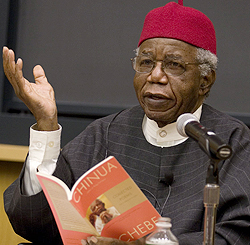Dear CAMLIT,
I’ve tried several times to write a tribute to Chinua Achebe by informing you about the role Bernard Nso’kika Fonlon and Mbella Sonne Dipoko played by rallying behind him through their writings. But my poor mastery of the computer literacy tends to fail me. My idea starts from September 1986 during the World Archaeological Congress held in Southampton, UK.
Dr. Elias Nwana, Patrick Mbunwe and myself only met in Southampton. Paa Nwana and Patrick arrived directly from Cameroon, while I had already been in Europe six months earlier and was actually anxious to meet them to get information about the Lake Nyos tragedy. So, as soon as we met, I went ahead and asked them for more details of what happened at Lake Nyos. But to my greatest surprised, Dr. Nwana told me calmly that the Lake Nyos tragedy was already old news, since Prof. Bernard Nso’kika Fonlon’s death was the most recent news. He actually made me to understand that Fonlon’s corpse was on its way to Cameroon after his death in Canada.
On the face of it, I scribbled a poem that reminded me of the last things I had shared together with Prof. Bernard Nso’kika Fonlon before leaving for Paris early that year. After the World Archaeological Congress, and in the course of some research to pay tribute to him, I discovered that Bernard Nso’kika Fonlon and Peter Ogbonnaya were the first scholars to have written a bookreview on Things Fall Apart in Presence Africaine -Cultural Review of the Negro World. Their most interesting translation into French was original, since it is differenct from the subsequent translation as Le Monde s’effondre which has now been popularized in the French Speaking literate world. Bernard Nso’kika Fonlon and Peter Ogbonnaya translated Things Fall Apart into French as L’Edifice s’ecroule.
And in a typical Fonlonian style, Bernard Nso’kika Fonlon and Peter Ogbonnaya observed: that “Chinua Achebe a ecrit un livre poignant. On a rarement depeint jusqu’ici les idees, les croyances, les lois et les coutumes qui regissent la vie des Ibos de facon aussi coloree. Le livre temoigne d’une recherche sincere et patiente et a la merite d’etre une histoire simple racontee simplement”…”Cependant toute (tout) ce que nous avons dit en fait de critique ne retire rien au grand merite de cet ouvrage. C’est un effort valable; et il faut esperer que non seulement Chinua Achebe poursuivra une carriere si brillamment commencee, mais encore que dans le nouveau Nigeria nombreux seront ceux qui suivront cet exemple” (In Presence Africaine N0 XXIII Decembre 1958- janvier 1959).
That notwithstanding, Joyce and Debussi, to add to your rich experience with Chinua Achebe, Things Fall Apart was our main text book for African Literature in the University of Paris III in 1975, when we were begging Students from allover Europe and elsewhere to register for Courses in African Literature. The proof of it all was that we were only seven Students (two from Germany, four from France and one from Cameroon (myself) in our class. Mind you it was rare to find African writers. I remember inviting Mbella Sonne Dipoko to the class because I had told my classmaids about his three books, but he did not come. He was then more concerned with his paintings than with anything else. The point I would like to make here is that Bernard Fonlon and Mbella Sonne Dipoko were somehow connected with this legendary Chinua Achebe. So, we as CAMLIT have a role to play in Achebe’s “crydie” so as to continue the work of these first two Cameroon Anglophone Writers together with the rest of humanity. They are our pathfinders and we will do well to keep on behind them. Let Curiosity in its next flights beyond Mars take samples of the over 50 languages into which Things Fall Apart has been translated into other planets, the Universe over!
I hope you can get this final text correctly
Bongasu Tanla Kishani

